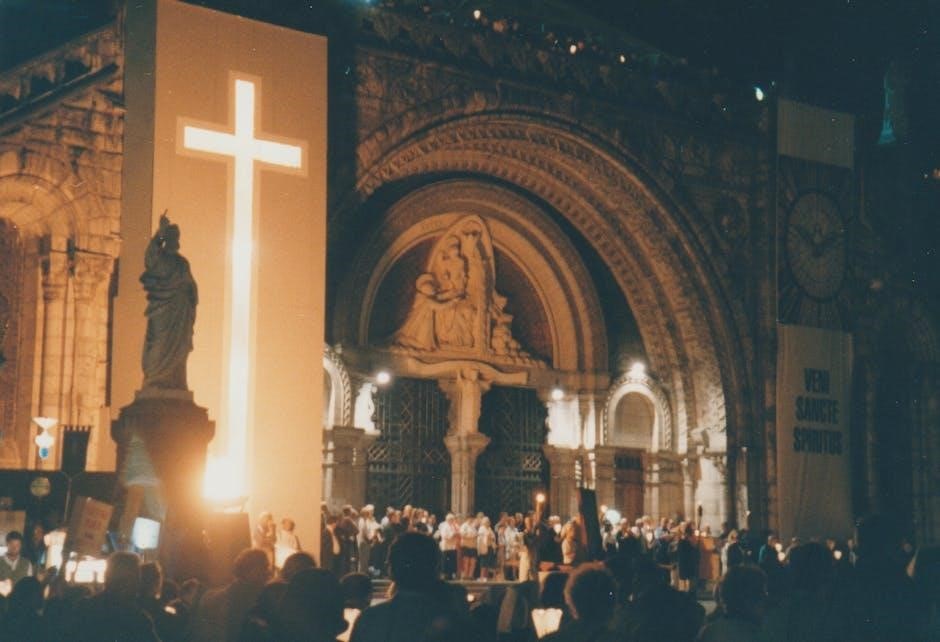Night by Elie Wiesel is a haunting memoir recounting the author’s survival during the Holocaust. This powerful narrative explores the horrors of Auschwitz, loss of faith, and the enduring human spirit, leaving a profound impact on readers worldwide.

Background and Significance
Night is a memoir by Elie Wiesel, recounting his harrowing experiences during the Holocaust. First published in 1960, the book is a pivotal work in Holocaust literature, offering a deeply personal and unflinching account of life in Nazi concentration camps. Wiesel’s narrative captures the brutality of Auschwitz, the psychological and spiritual struggles of its victims, and the enduring questions of faith and humanity in the face of unimaginable suffering. The book is significant not only for its historical value but also for its exploration of universal themes such as hope, survival, and the search for meaning in a chaotic world. Wiesel’s testimony has become a cornerstone of Holocaust education, providing readers with a raw and emotional understanding of one of history’s darkest chapters. Its profound impact has made it a essential read for generations, fostering empathy, reflection, and a commitment to combating prejudice and injustice.

Plot Summary

Night recounts Eliezer’s harrowing journey through the Holocaust, from his deportation to Auschwitz to his liberation. The memoir vividly portrays the horrors of concentration camps, the erosion of faith, and the struggle to survive amidst unimaginable cruelty.
Arrival at Auschwitz
Eliezer’s arrival at Auschwitz marked the beginning of unimaginable horrors. The SS guards herded him and his family into cattle cars, where they endured days of suffocating conditions. Upon arrival, the air was thick with the smell of burning flesh, and chaos reigned as families were brutally separated. Eliezer, just 15, clung to his father as they were forced into lines for “selection.” The Nazi officers, with cold precision, directed prisoners to either work or immediate death. The sight of children, the elderly, and the weak being led to the gas chambers left Eliezer in a state of numbing disbelief. This moment shattered his innocence and marked the start of his spiritual struggle. The arrival at Auschwitz was not just a physical location but a descent into a nightmare of dehumanization and despair, forever altering Eliezer’s perception of humanity and faith.
Journey Through Concentration Camps
Eliezer’s harrowing journey through Nazi concentration camps began at Auschwitz, where he witnessed unimaginable atrocities. After being subjected to brutal conditions, he and his father were transferred to Buna, a work camp, where they endured forced labor, malnutrition, and constant terror. The SS guards’ relentless cruelty and the prisoners’ struggle for survival dominated daily life. As the Allies advanced, Eliezer and his father were forced on a death march to Buchenwald, a grueling ordeal marked by freezing temperatures, starvation, and the deaths of countless prisoners. Upon arrival, Eliezer’s father succumbed to dysentery, leaving him alone. The liberation by American forces brought an end to the nightmare, but the scars of the camps remained deeply etched in Eliezer’s soul. His journey through the camps revealed the depths of human suffering and the resilience required to survive amidst unimaginable evil.

Themes

The memoir explores profound themes, including the loss of innocence, faith, and humanity amidst unimaginable horror. It delves into the psychological and emotional toll of the Holocaust, revealing the dehumanizing effects of oppression and the survival instinct’s dominance over moral principles.
Faith and Spirituality
Faith and spirituality are central themes in Night, as Elie Wiesel grapples with his devout Jewish upbringing amidst the horrors of the Holocaust. Initially, his deep connection to God and religious rituals provides comfort and meaning. However, the atrocities he witnesses—children thrown into fiery pits, mass executions, and unbearable suffering—challenge his belief in a benevolent God. The SS officers’ cruelty and the dehumanizing conditions of the concentration camps force Elie to question the existence of divine justice. His faith falters as he struggles to reconcile the idea of a loving God with the unimaginable evil surrounding him. By the end of the memoir, Elie’s relationship with spirituality is deeply scarred, leaving him with a profound sense of existential doubt. This internal conflict reflects the broader theological questions raised by the Holocaust, making Night a powerful exploration of faith in the face of unimaginable suffering.
Literary Style
Elie Wiesel’s Night is marked by a sparse, haunting prose that mirrors the starkness of his experiences. His use of vivid imagery and understated emotion underscores the horror, while his clarity amplifies the narrative’s emotional weight.

Narrative Technique and Symbolism
Elie Wiesel employs a non-linear narrative in Night, using flashbacks to reflect on his pre-Auschwitz life. The first-person perspective creates intimacy, immersing readers in his trauma. Wiesel’s use of present tense heightens immediacy, making the atrocities feel vivid and raw.
Symbolism is central to the text. The night itself represents the darkness of humanity and the void of hope. The crematoria symbolize industrialized death and dehumanization. The Holocaust serves as a symbol of humanity’s capacity for evil, while Wiesel’s loss of faith mirrors the spiritual devastation of millions.
Through these techniques, Wiesel transforms his personal tragedy into a universal testament, ensuring the Holocaust’s horrors are never forgotten. His storytelling underscores the enduring impact of such atrocities on individuals and humanity as a whole.
Impact and Legacy

Elie Wiesel’s Night has profoundly impacted Holocaust awareness and education, becoming a vital resource for understanding the atrocities and promoting global tolerance. Its legacy endures as a powerful warning against hatred and oppression.

Critical Reception
Elie Wiesel’s Night received widespread critical acclaim for its unflinching portrayal of the Holocaust; Initially, some critics found the subject matter too distressing, but over time, the memoir has been recognized as a seminal work in Holocaust literature. Scholars praise its raw honesty and emotional depth, while others highlight its ability to convey the unimaginable horrors of concentration camps. The book’s vivid imagery and stark prose have been particularly noted for their power to evoke empathy and reflection. Despite early controversies surrounding its publication, Night has become a cornerstone of Holocaust studies and a required text in many educational curricula. Its enduring relevance has solidified its place as a vital historical and literary document, offering a personal yet universal perspective on one of humanity’s darkest chapters. Wiesel’s work continues to resonate, earning him the Nobel Peace Prize in 1986 and cementing his legacy as a voice for justice and remembrance.

Educational Role
Elie Wiesel’s Night plays a pivotal role in education, serving as a cornerstone for Holocaust studies worldwide. Its vivid, personal account of Auschwitz and other concentration camps provides students with a deeply human perspective on historical atrocities; The memoir is widely incorporated into school curricula due to its ability to foster empathy, historical understanding, and critical thinking. It challenges young readers to grapple with themes of morality, faith, and the resilience of the human spirit. Educators often use Night to teach the importance of tolerance and the dangers of prejudice, encouraging students to reflect on the consequences of hatred and indifference. By sharing Wiesel’s experiences, the book bridges the gap between history and personal narrative, making the Holocaust more accessible and relatable for younger generations. Its inclusion in educational programs ensures that the lessons of the Holocaust are not forgotten, fostering a more informed and compassionate society.
Elie Wiesel’s Night stands as a powerful testament to the atrocities of the Holocaust and the enduring strength of the human spirit. Through its unflinching narrative, the memoir confronts themes of faith, hope, and humanity in the face of unimaginable suffering. Wiesel’s personal journey from innocence to despair and ultimate survival serves as a poignant reminder of history’s darkest chapter. The book’s enduring relevance lies in its ability to educate and inspire, urging readers to reflect on the consequences of hatred and the importance of vigilance against injustice. As a survivor and Nobel laureate, Wiesel’s voice became a symbol of hope and advocacy for human rights. Night remains a vital work, ensuring that the Holocaust’s lessons are never forgotten and fostering a more compassionate and informed world. Its impact continues to resonate, making it an essential read for generations seeking to understand the past and build a better future.